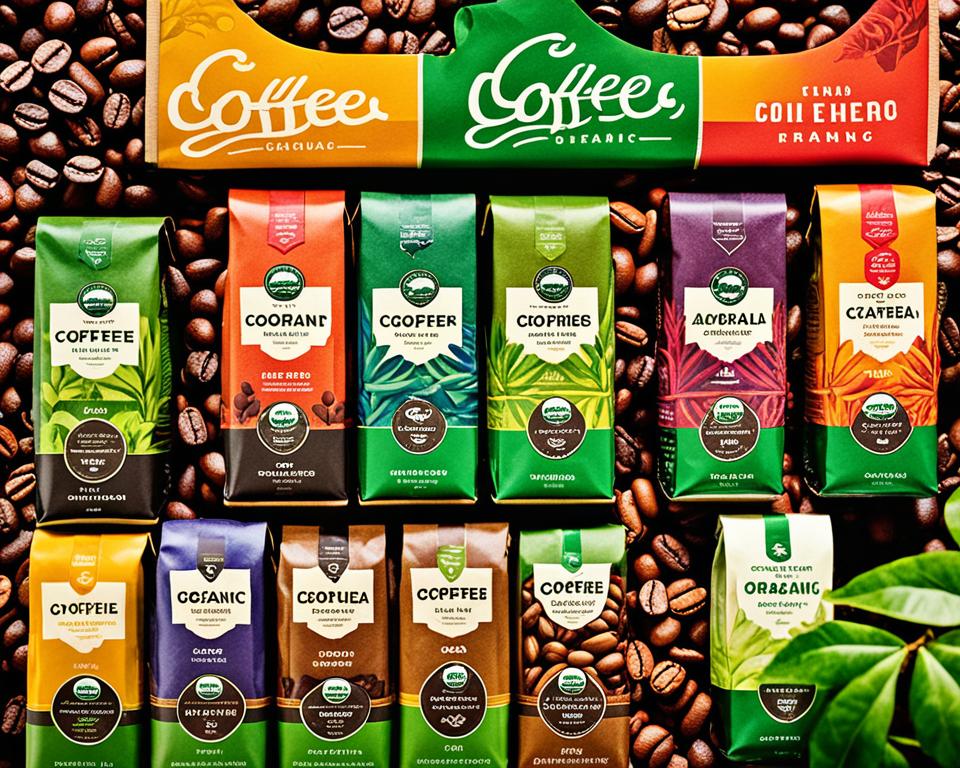Every day, about 2.25 billion cups of coffee fill our mugs worldwide. This shows how much we love this aromatic drink. But there’s more to coffee than just its warmth. Drinking 3 to 5 cups a day can decrease the risk of many chronic diseases. Organic coffee stands out by offering health benefits, great taste, and eco-friendly farming.
Enjoying the rich flavours of organic coffee is a choice I make for my health and the planet. By choosing organic coffee, we help both ourselves and the environment.
It promotes ecosystems without using harmful chemicals. Choosing organic coffee over regular coffee is more than a preference; it’s a duty to the world.
Seeing the USDA seal on my coffee ensures I’m getting the health benefits of organic coffee. This coffee is free from artificial pesticides and chemicals. It’s made considering nature’s goodness. Let’s make our morning coffee a moment to care for the environment and ourselves.
Key Takeaways
- Organic coffee supports a reduction in chronic disease risks and enhances overall health.
- USDA certification marks a product that meets high organic farming standards.
- Choosing organic over regular coffee upholds sustainability and minimises chemical exposure.
- The health benefits of organic coffee encompass mental clarity and reduced disease risks.
- Consuming organic coffee ties personal health choices to greater environmental consciousness.
What Is Organic Coffee, and How Is It Different?
Organic coffee takes us on a journey through green fields. It shows our commitment to responsible living. The special thing about this coffee is how it’s grown. It cares for our planet and health. Choosing sustainable organic coffee means we help nurture the earth.
But it’s more than just being eco-friendly. Organic coffee nutrition is clean, without harmful chemicals. That’s a big reason why people, including me, prefer organic coffee.

Definition of Organic Coffee
What does “organic” mean? It’s coffee grown without synthetic stuff like fertilizers or GMOs. The beans grow naturally, helping keep nature in balance. So, every sip supports a healthier world.
The Certification Process by USDA NOP
Getting USDA NOP certified is tough for coffee growers. They must follow strict organic rules. Their farms get checked to be sure they’re eco-friendly and safe. This certification is why I trust organic coffee.
Comparing Conventional and Organic Coffee Production
Organic and regular coffee are quite different. Organic grows in a way that’s good for Earth and us coffee lovers. It blends mindful choices with great taste without losing quality.
| Attribute | Organic Coffee | Conventional Coffee |
|---|---|---|
| Chemical Use | None | Widespread |
| Environmental Impact | Lower | Higher |
| Certification Process | Stringent (USDA NOP) | Not Applicable |
| Sustainability | High Priority | Varies |
| Health Implications | Potentially Better | Unknown Chemical Residue |
In summary, choosing sustainable organic coffee is more than just about taste. It shows I care about where my coffee comes from. With organic coffee, I know I’m getting quality nutrition and helping the planet.
Organic Coffee Benefits: Health Advantages You Should Know
When switching to organic coffee, I looked for more than a great taste. I wanted to know the benefits of drinking organic coffee. Coffee’s health impact has seen ups and downs over time. In 1991, the World Health Organization hinted that coffee might be harmful. By 2016, studies countered this, suggesting coffee could lower some cancer risks when not paired with smoking.
Yet in 2018, a law demanding cancer warnings on coffee created buzz. My choice of organic coffee, though, stayed above the fray. This is because the health benefits range from rich antioxidants to lacking the chemicals found in regular coffee.
Unlike conventional beans, organic ones rarely face chemical treatments.
A regular 8-ounce cup of coffee has about 95 mg of caffeine. This fits the daily recommendation of 3-5 cups, totaling about 400 mg. Enjoying this amount can boost alertness and lower disease risk.
Pregnant women should limit their intake to under 200 mg. That’s about two cups. Decaf drinkers, good news: health perks like guarding against depression still apply.
| Year | Insight | Impact on Coffee Perception |
|---|---|---|
| 1991 | Possible carcinogen | Concern Among Consumers |
| 2016 | There is no increased cancer risk | Positive Shift in View |
| 2018 | Cancer warning label legislation | Mixed Reactions |
As someone mindful about health and the planet, knowing 95% of organic beans are chemical-free is comforting. Plus, discovering that light and dark roasts have similar caffeine levels was a surprise. Here’s a tip: don’t reuse your coffee grinds. It’s a little fact I love to share.
Choosing organic brands like LifeBoost and Café Don Pablo Subtle Earth Organic benefits my taste buds more. It’s also about supporting methods that are kinder to the earth. Realising my coffee can come from sustainably grown beans brings me peace. Plus, it helps me meet my daily water intake.
The Impact of Organic Coffee Consumption on Well-Being

Mood improvement and mental health
A cup of organic coffee in the morning might boost your mood. Research shows caffeine lowers the risk of depression. It also protects the brain, potentially preventing diseases like Alzheimer’s.
Preventative Effects Against Chronic Diseases
The benefits of organic coffee are vast. Studies link it to lower risks of diseases like heart disease and diabetes. It may even reduce the risk of colorectal cancer.
Adding organic coffee to my diet helps with prevention.
Organic Coffee and Physical Performance
Caffeine is known to boost physical performance. It stimulates brown fat, improving exercise outcomes. It also helps the body use insulin better.
This explains why many people choose organic coffee for weight loss and health.
Considering all the data, organic coffee has many benefits. It prevents diseases and boosts physical health. My daily cup is key to a healthy life. It’s truly energising!
Organic Coffee vs. Regular Coffee: Flavour and Quality Considerations
The debate between organic and regular coffee is long-standing. Taste seekers and those who care for the environment prefer the best organic coffee brands.
They offer pure taste and high nutrition.

The Taste of Organic Coffee
Organic coffee’s charm isn’t just in being chemical-free. It’s also about its rich flavors. Drinking coffee from brands like Liberty Beans Coffee reveals deep, complex tastes.
Unlike regular coffee, it’s genuine and made from 100% ethically sourced beans. This gives it a quality like that of fine wine.
Regular Coffee: What You’re Missing Out On
Regular coffee sometimes contains pesticides and doesn’t focus much on being eco-friendly. But brands like Starbucks and Peet’s Coffee care about organic nutrition.
They also help me support sustainable coffee practices.
Purity of the Bean and Brewing Techniques
My morning starts with pure organic coffee. Using freshly roasted beans, the right coffee-to-water ratio, and the perfect water temperature makes my coffee vibrant and full of antioxidants.
Safe brewing and serving are key to an enjoyable experience.
| Category | Organic Coffee | Regular Coffee |
|---|---|---|
| Freshness | Roasted in small batches for optimal freshness | Varies widely; may not prioritize freshness |
| Flavor | Rich, complex, and untainted | Can be compromised by chemicals |
| Health Impact | Higher antioxidant levels | Less control over nutrient content |
| Eco-Friendly | Yes, supports sustainable practices | Not necessarily; they may lack eco-certifications |
I clearly prefer organic coffee. It’s not just better for health and the planet. It also tastes amazing every time I drink it.
Eco-Friendly and Sustainable Practices in Organic Coffee Farming
When I make a mug of aromatic, sustainable organic coffee, I feel thankful. I’m grateful for the eco-friendly methods that make this possible. These techniques protect everything, from the soil to the whole ecosystem.
When I pick certified organic coffee, I support a farming style that avoids synthetic harm. It truly captures organic coffee nutrition at its best.
The roasting process of this special coffee hits temperatures beyond 450 degrees Fahrenheit. This step is key to ensuring a clean cup of coffee. It’s thought to remove any chemicals.
Every time I try a new organic coffee, I enjoy flavours from different places and roasting skills. It feels like a mix of taste and responsibility.
Trade has connected me with over 400 top-level roasters who care about the planet. Their subscription service finds coffees that suit my taste perfectly. More than just good coffee, it’s about supporting communities and loving our planet.
- Organic coffee farming is key to environmental sustainability.
- Roasting organic beans at high temperatures cuts down on chemicals.
- Choosing certified organic coffee helps our health and the earth.
Supporting these services is more than just enjoying good coffee. It’s about choosing a path where ease and care for the earth meet. This decision helps our world and our future, one cup at a time.
In a world full of choices, I’m proud to support a cause that values flavour and the planet.
Is Organic Honduran Coffee More Beneficial Compared to Other Organic Coffees?
When exploring the world of coffee, many enthusiasts seek to discover the rich flavors of honduran coffee. This unique variety boasts a distinct taste profile, often praised for its smoothness and complexity, setting it apart from other organic coffees. Its cultivation in mountainous regions enhances its vibrant and aromatic notes.
Organic Coffee Benefits for Weight Loss and Nutrition
I’m fascinated by how my drinks affect my health. Organic coffee isn’t just for a morning buzz. It’s for health too. Every cup is full of antioxidants and free of bad stuff.
It helps keep my metabolism up and might help with weight control.
Nutritional Profile of Organic Coffee
Organic coffee isn’t just energizing. It’s loaded with antioxidants that help my health every day. These antioxidants fight stress and inflammation.
This can lead to better health overall. Plus, organic coffee can support the body’s weight management naturally.
Role in Metabolism and Weight Management
Organic coffee is great for stimulating “good” brown fats. This means better calorie burning.
Drinking coffee makes me happy, knowing it supports my healthy lifestyle. Combined with a balanced diet, it helps in my wellness journey.
There’s evidence that coffee lowers the risk of diseases like type 2 diabetes and heart disease. So, my morning coffee does more than wake me up.
FAQ
What are the health benefits of organic coffee?
Organic coffee boosts your mood and metabolism. It supports your immune system. It also offers antioxidants, which fight chronic diseases.
Why should I choose organic coffee over regular?
Organic coffee is grown without harmful chemicals. It offers a cleaner, purer taste. Plus, it supports eco-friendly farming, which helps our planet.
What does the USDA NOP certification for organic coffee entail?
The USDA NOP certification means strict farming guidelines are followed. It promotes natural substances and ecological balance. Farms get regular checks for compliance.
How does organic coffee consumption impact my well-being?
Organic coffee lifts your mood. It may guard against Alzheimer’s and Parkinson’s. It also boosts physical performance and helps manage blood sugar.
Can organic coffee enhance physical performance?
Yes, organic coffee boosts metabolism and workout efficiency. It increases endurance and helps burn calories quickly.
Does organic coffee offer better flavour than regular coffee?
Many believe organic coffee tastes richer and more robust than regular. This is thanks to quality soil and sustainable farming.
How does organic coffee contribute to sustainability and environmental health?
Organic farming avoids harsh chemicals. This preserves soil health, saves water, and cuts pollution. It protects wildlife and farmworkers too.
Is organic coffee nutritionally different from regular coffee?
Organic coffee may have more antioxidants due to its chemical-free cultivation. This could lessen oxidative stress in your body.
Can drinking organic coffee help with weight loss?
Organic coffee could aid weight loss by boosting metabolism and activating ‘good’ brown fat. Yet, it’s best within a healthy lifestyle.
What are some reputable organic coffee brands?
Top organic coffee brands include Equal Exchange, Cafe Don Pablo, and Death Wish Coffee. They focus on quality and sustainable practices.




